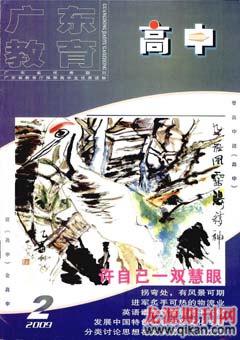常用英语谚语辑录
陈清林
谚语是洋溢着文化气息的哲理性语言,是智慧的结晶。熟读背诵一些谚语有助于学习或巩固语法知识。不仅如此,在写作中,如果考生能够恰当地运用一两句谚语,可使语言活泼风趣,增强文章的表现力,提升作文层次,让阅卷老师眼前一亮。笔者现辑录一些写作中常用的谚语以飨考生。
1. Actions speak louder than words. 行动比言语更有说服力。(事实胜于雄辩)
2. Better late than never. 迟做总比不做好。
3. Honesty is the best policy. 诚实总是上策。
4. The best fish are / swim near the bottom. 好鱼居水底。(有价值的东西不能轻易得到)
5. The more you get, the more you want. 拥有越多,想要越多。
注:以上五句谚语运用了形容词、副词比较级或最高级。
6. A rising tide lifts all boats. 水涨船高。
7. Time lost cannot be recalled. 光阴一去不复返。
8. To stand still is to move back. 逆水行舟,不进则退。
9. Saving is getting. 节约而后有。(节约就是获得)
10. It is no use crying over spilt milk. 覆水难收。(打翻牛奶,哭也没用)
注:以上五句运用了非谓语动词。
11. All work and no play makes Jack a dull boy. 只工作(学习)不玩耍,聪明孩子也变傻。
12. Early to bed and early to rise makes a man healthy, wealthy, and wise. 早起早睡使你健康、富裕、聪明。
13. An apple a day keeps the doctor away.多吃水果利健康。(一天一苹果,医生远离我)
14. A bsence makes the heart grow fonder. 久别情深。
15. Money makes the mare(母马,母驴) go. 有钱能使鬼推磨。
16. You may take a horse to the water, but you cannot make him drink. 领马河边易,逼马饮水难。(不要逼人做不愿做的事)
注:以上六句运用了“vt. + 宾语+ 宾语补足语”句型。
17. A bird in the hand is worth two in the bush. 双鸟在林不如一鸟在手。
18. An hour in the morning is worth two in the evening. 一日之计在于晨。
19. Hope for the best and prepare for the worst. 抱最好的希望,作最坏的准备。
20. Its never too late to mend. 改过迁善从不嫌晚。(亡羊补牢,未为晚也)
21. One is never too old to learn. 活到老,学到老。
22. Reading is to the mind what exercise is to the body. 阅读对于我们心灵之重要,犹如运动对于身体一样。
注:以上六句运用了be worth..., hope for..., prepare for..., too... to..., A is to B what C is to D等固定结构。
23. All that glitters(闪烁) is not gold. / All is not gold that glitters. 闪光的并非都是金子。
24. All that dogs bark at are not thieves. / All are not thieves that dogs bark at. 狗吠者未必是贼。(勿以貌取人)
25. Every couple is not a pair. / Not every couple is a pair. 成双未必能配对。
注:以上三句运用了部分否定结构。
26. It is a good horse that never stumbles(绊倒), and a good wife that never grumbles(牢骚).良马会失蹄,贤妻有牢骚。
27. Its a long lane(小巷)that has no turning. 路必有弯,事必有变。
28. It is love that makes the world go round. 爱使世界更美好。
29. It is the early bird that catches the worm. 早出的鸟儿吃到虫。(捷足先登)
注:以上四句运用了强调句型。
30. A fall into the pit(陷井), a gain in your wit(才智). 吃一堑,长一智。
31. An eye for an eye, a tooth for a tooth. 以眼还眼,以牙还牙。
32. Never put off till tomorrow. 今日事,今日毕。
33. Once bitten, twice shy. 一朝被蛇咬,十年怕井绳。
34. Out of sight, out of mind. 眼不见,心不想。
35. Waste not, want not. 不浪费,不愁缺。
注:以上六句运用了“省略”,表达精练,语言生动。
36. Alls well that ends well. 结果好就是一切好。
37. He laughs best who laughs last. 谁笑在最后,谁笑得最好。
38. Those who live in glass houses should not throw stones. 家居玻璃房,切忌乱扔石。(自己有弱点,勿揭他人短)
注:以上三句运用了定语从句。
39. Dont count your chickens before they are hatched.小鸡孵出前,先别忙点数。(办事尚未果,不把成功言)(不要过早乐观)
40. When in Rome do as the Romans do. 入乡从俗。
41. Where there is life there is hope. 有生命就有希望。(留得青山在,不怕没柴烧)
42. Where theres a will, theres a way. 有志者事竟成。
43. Where theres smoke, theres fire. 无风不起浪。
44. If at first you dont succeed, try, try, try again. 再接再厉,终会成功。
45. If a thing is worth doing, its worth doing well. 凡值得一做的都值得做好。
注:以上各句分别运用了时间状语从句、方式状语从句、地点状语从句和条件状语从句。
46. Whats learnt in the cradle(摇篮) lasts till the tomb. 摇篮中所学,受用到墓穴。(孩提时代学到的东西,至死不忘)
注:以上这句运用了主语从句。
责任编校 蒋小青

